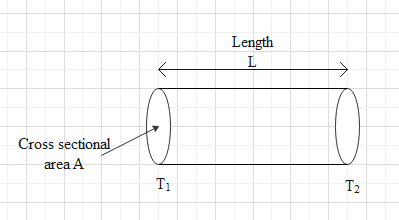
The coefficient of thermal conductivity of a metallic rod does not depend upon:
(The question has multiple correct option)
A) The length of the rod.
B) The cross-sectional area of the rod.
C) Temperature difference between the ends of the rod.
D) The nature of the material.
Answer
587.7k+ views
Hint: Thermal conductivity or coefficient of thermal conductivity is the quantity which tells us the ability of a material to transfer heat through them. Here we will discuss the thermal conductivity in detail and the factor on which it depends. By doing so we will get the factors which are independent of thermal conductivity. As it is multiple correct option type questions one or more than one option can be correct.
Complete step by step answer:
Thermal conductivity is the property of the material which tells us its ability to conduct heat; its value varies from material to material hence we can say that the thermal conductivity depends on the nature of material or the type of material.
To know the other factors on which it depends let us consider a metallic rod of length L and the cross sectional area A, and the temperature at the ends of the rod is \[{{T}_{1}}\text{ and }{{T}_{2}}\]respectively.

Then the heat which will flow through the material will be proportional to the cross sectional area as the larger the area the more heat can flow. Similarly it will be proportional to the temperature difference and inversely proportional to the length of the rod.
If heat flow given as Q, then considering all the proportionality we can write
\[\begin{align}
& Q\propto \dfrac{A({{T}_{1}}-{{T}_{2}})}{L} \\
& Q=k\dfrac{A({{T}_{1}}-{{T}_{2}})}{L} \\
\end{align}\]
Where k is the proportionality constant and known as coefficient of thermal conductivity. Hence we can say that thermal conductivity or coefficient of thermal conductivity does not depend on length or cross sectional area or the temperature difference. It just depends on the type of material.
Hence correct options are A,B and C.
Note:
We can also see that as thermal conductivity is the internal property of a material to conduct heat therefore it will depend only on the nature of material. Also thermal conductivity is the same as electrical conductivity only difference is electrical conductivity there is transfer of charges whereas here there is transfer of heat.
Complete step by step answer:
Thermal conductivity is the property of the material which tells us its ability to conduct heat; its value varies from material to material hence we can say that the thermal conductivity depends on the nature of material or the type of material.
To know the other factors on which it depends let us consider a metallic rod of length L and the cross sectional area A, and the temperature at the ends of the rod is \[{{T}_{1}}\text{ and }{{T}_{2}}\]respectively.

Then the heat which will flow through the material will be proportional to the cross sectional area as the larger the area the more heat can flow. Similarly it will be proportional to the temperature difference and inversely proportional to the length of the rod.
If heat flow given as Q, then considering all the proportionality we can write
\[\begin{align}
& Q\propto \dfrac{A({{T}_{1}}-{{T}_{2}})}{L} \\
& Q=k\dfrac{A({{T}_{1}}-{{T}_{2}})}{L} \\
\end{align}\]
Where k is the proportionality constant and known as coefficient of thermal conductivity. Hence we can say that thermal conductivity or coefficient of thermal conductivity does not depend on length or cross sectional area or the temperature difference. It just depends on the type of material.
Hence correct options are A,B and C.
Note:
We can also see that as thermal conductivity is the internal property of a material to conduct heat therefore it will depend only on the nature of material. Also thermal conductivity is the same as electrical conductivity only difference is electrical conductivity there is transfer of charges whereas here there is transfer of heat.
Recently Updated Pages
Master Class 11 Computer Science: Engaging Questions & Answers for Success

Master Class 11 Business Studies: Engaging Questions & Answers for Success

Master Class 11 Economics: Engaging Questions & Answers for Success

Master Class 11 English: Engaging Questions & Answers for Success

Master Class 11 Maths: Engaging Questions & Answers for Success

Master Class 11 Biology: Engaging Questions & Answers for Success

Trending doubts
One Metric ton is equal to kg A 10000 B 1000 C 100 class 11 physics CBSE

There are 720 permutations of the digits 1 2 3 4 5 class 11 maths CBSE

Discuss the various forms of bacteria class 11 biology CBSE

Draw a diagram of a plant cell and label at least eight class 11 biology CBSE

State the laws of reflection of light

Explain zero factorial class 11 maths CBSE




